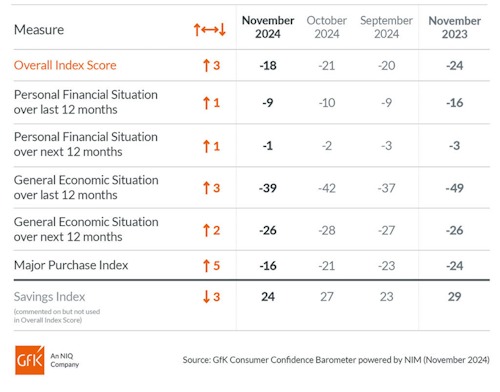Retail sales in the UK fell for the first time in three months in October as consumers held back on their spending ahead of the Budget.
Figures from the Office for National Statistics (ONS) show sales volumes fell 0.7% in October, following a downward revised growth of 0.1% the previous month.
Non-food stores were hardest hit, with volumes down 1.4% last month, following a rise of 2.3% in September. Within this subsector, the strongest downward contribution came from clothing (-3.1%) after the previous period was boosted by end-of-season sales. Analysts also suggested that shoppers were delaying purchases ahead of Black Friday and Christmas.
Meanwhile, sales at supermarkets and food stores decreased by 0.6%, partly due to the phasing of half term.
“It’s clear that falling consumer sentiment and uncertainty ahead of the Budget at the end of last month put a dampener on shoppers’ plans, with unfortunate timing at the start of retail’s critical Golden Quarter. With shoppers also telling us that they had started their Christmas shopping early, this does not bode well for the upcoming festive season,” said Lisa Hooker, Leader of Industry for Consumer Markets at PwC UK.
“However, what gives us confidence that there could be light at the end of the tunnel is that with no major overnight personal tax rises, the Budget largely did not affect consumer spending power in the short term. Moreover, our most recent survey at the start of November found that shoppers were planning to spend almost 40% more than last year over the Black Friday sales period, helped by both higher disposable income and later timing after payday compared with last year. According to PwC estimates, that would represent a further £2bn boost in Black Friday spending in 2024 compared with 2023.
“Retailers will be hoping that the momentum gained by an improving sales trend in November sets them in good stead for a recovery in December, as Christmas shopping gets into full swing.”
Separate data released today suggests consumer confidence picked up this month as uncertainty about people’s finances eased.
GfK’s Consumer Confidence Index increased by three points to -18 in November, with all measures up in comparison to last month’s figures.

“There was evidence of nervousness in recent months as consumers contemplated the potentially worrying impact of the UK Budget at home, and even the implications of the US presidential election. But we have moved past those events now,” said Neil Bellamy, Consumer Insights Director at GfK.
“The biggest change this month is in major purchase intentions, an important measure that has jumped five points from -21 to -16 in the run-up to Black Friday next week. The other four measures, covering personal financial expectations and the wider economy, have registered small increases too. But while 2025 is just around the corner and the New Year often brings optimism, it’s too early to expect significant further improvements in the consumer mood. As recent data shows, inflation has yet to be tamed, people are still feeling acute cost of living pressures, and it will take time for the UK’s new government to deliver on its promise of ‘change’.”
NAM Implications:
- Despite the confusion…
- …suppliers can by confident that the basics apply in terms of applying common sense:
- We are in a continuing cost of living crises
- Continuing uncertainty
- Consumers have focused on purchasing essentials
- Postponed buying of big-ticket items
- Hopefully in anticipation of Black Friday bargains
- Fingers crossed…




